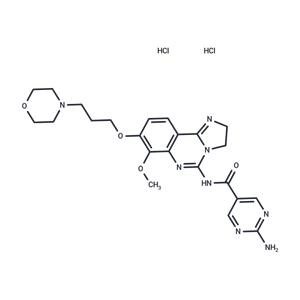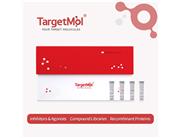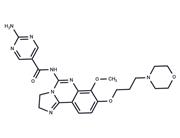| Name | Copanlisib dihydrochloride |
| Description | Copanlisib dihydrochloride (BAY 80-6946 dihydrochloride) is an ATP-competitive pan-class I PI3K inhibitor, with IC50 values of 0.5 nM for PI3Kα, 0.7 nM for PI3Kδ, 3.7 nM for PI3Kβ, and 6.4 nM for PI3Kγ. It exhibits superior antitumor activity and demonstrates more than 2,000-fold selectivity against other lipid and protein kinases, except for mTOR. |
| In vitro | In both KPL4 cells and LPA-stimulated PC3 cells, BAY 80-6946 reduces pAKT levels. In a subset of human cancer cell lines with PIK3CA mutations and/or overexpression of HER2, BAY 80-6946 shows antiproliferative activity and induces apoptosis. [1] The combination of HER2-targeted therapies and BAY 80-6946 inhibits growth more effectively than either therapy used alone, and can restore sensitivity to trastuzumab and lapatinib in cells. [2] |
| In vivo | In rat KPL4 or HCT116 tumor xenograft model, BAY 80-6946 (6 mg/kg, i.v.) induces 100% complete tumor regression. In nude mice with Lu7860 erlotinib-resistant, patient-derived NSCLC and MAXF1398 patient-derived luminal breast tumor models, BAY 80-6946 (14 mg/kg, i.v.) also causes tumor growth inhibition. [1] |
| Storage | Powder: -20°C for 3 years | In solvent: -80°C for 1 year | Shipping with blue ice. |
| Solubility Information | DMSO : 1 mg/mL
H2O : 20 mg/mL, Sonication is recommended.
|
| Keywords | Inhibitor | antiproliferative | inhibit | intravenous | BAY 80-6946 | Copanlisib dihydrochloride | sub-nanomolar | Copanlisib | BAY 80-6946 Dihydrochloride | PI3K | phosphorylation | Copanlisib Dihydrochloride | Phosphoinositide 3-kinase | AKT | Apoptosis | antitumor | administration |
| Inhibitors Related | Stavudine | Sodium 4-phenylbutyrate | Tributyrin |
| Related Compound Libraries | Bioactive Compound Library | Kinase Inhibitor Library | Drug Repurposing Compound Library | FDA-Approved Drug Library | Bioactive Compounds Library Max | Anti-Cancer Drug Library | Anti-Cancer Active Compound Library |

 United States
United States



